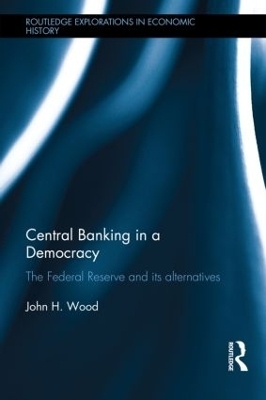
Central Banking in a Democracy
The Federal Reserve and its Alternatives
Seiten
2014
Routledge (Verlag)
978-1-138-01639-2 (ISBN)
Routledge (Verlag)
978-1-138-01639-2 (ISBN)
The Federal Reserve System, which has been Congress’s agent for the control of money since 1913, has a mixed reputation. Its errors have been huge. It was the principal cause of the Great Depression of the 1930s and the inflation of the 1970s, and participated in the massive bailouts of financial institutions at taxpayer’s expense during the recent Great Recession.
The Federal Reserve System, which has been Congress’s agent for the control of money since 1913, has a mixed reputation. Its errors have been huge. It was the principal cause of the Great Depression of the 1930s and the inflation of the 1970s, and participated in the massive bailouts of financial institutions at taxpayers' expense during the recent Great Recession.
This book is a study of the causes of the Fed’s errors, with lessons for an improved monetary authority, beginning with an examination of the history of central banks, in which it is found that their performance depended on their incentives, as is to be expected of economic agents. An implication of these findings is that the Fed’s failings must be traced to its institutional independence, particularly of the public welfare. Consequently, its policies have been dictated by special interests: financial institutions who desire public support without meaningful regulation, as well as presidents and those portions of Congress desiring growing government financed by inflation.
Monetary stability (which used to be thought the primary purpose of central banks) requires responsibility, meaning punishment for failure, instead of a remote and irresponsible (to the public) agency such as the Fed. It requires either private money motivated by profit or Congress disciplined by the electoral system as before 1913. Change involving the least disturbance to the system suggests the latter.
The Federal Reserve System, which has been Congress’s agent for the control of money since 1913, has a mixed reputation. Its errors have been huge. It was the principal cause of the Great Depression of the 1930s and the inflation of the 1970s, and participated in the massive bailouts of financial institutions at taxpayers' expense during the recent Great Recession.
This book is a study of the causes of the Fed’s errors, with lessons for an improved monetary authority, beginning with an examination of the history of central banks, in which it is found that their performance depended on their incentives, as is to be expected of economic agents. An implication of these findings is that the Fed’s failings must be traced to its institutional independence, particularly of the public welfare. Consequently, its policies have been dictated by special interests: financial institutions who desire public support without meaningful regulation, as well as presidents and those portions of Congress desiring growing government financed by inflation.
Monetary stability (which used to be thought the primary purpose of central banks) requires responsibility, meaning punishment for failure, instead of a remote and irresponsible (to the public) agency such as the Fed. It requires either private money motivated by profit or Congress disciplined by the electoral system as before 1913. Change involving the least disturbance to the system suggests the latter.
John H. Wood is Reynolds Professor of Economics at Wake Forest University, Winston-Salem, North Carolina, USA.
1. Introduction 2. Early central banks 3. Central banking in the United States, 1847-1913 4. The Federal Reserve Sysyem, 1913-51 5. The Federal Reserve, 1951-99 6. The Great Recession 7. Bank regulation 8. Conclusion: The necessity and possibility of replacing the Fed
| Reihe/Serie | Routledge Explorations in Economic History |
|---|---|
| Zusatzinfo | 16 Tables, black and white; 16 Line drawings, black and white; 7 Halftones, black and white; 16 Illustrations, black and white |
| Verlagsort | London |
| Sprache | englisch |
| Maße | 156 x 234 mm |
| Gewicht | 476 g |
| Themenwelt | Geschichte ► Allgemeine Geschichte ► Neuzeit (bis 1918) |
| Geisteswissenschaften ► Geschichte ► Regional- / Ländergeschichte | |
| Geschichte ► Teilgebiete der Geschichte ► Wirtschaftsgeschichte | |
| Wirtschaft ► Betriebswirtschaft / Management ► Finanzierung | |
| Betriebswirtschaft / Management ► Spezielle Betriebswirtschaftslehre ► Bankbetriebslehre | |
| Wirtschaft ► Volkswirtschaftslehre ► Finanzwissenschaft | |
| ISBN-10 | 1-138-01639-X / 113801639X |
| ISBN-13 | 978-1-138-01639-2 / 9781138016392 |
| Zustand | Neuware |
| Haben Sie eine Frage zum Produkt? |
Mehr entdecken
aus dem Bereich
aus dem Bereich
Europa 1848/49 und der Kampf für eine neue Welt
Buch | Hardcover (2023)
DVA (Verlag)
48,00 €
Giordano Bruno - ein ketzerisches Leben
Buch | Hardcover (2024)
C.H.Beck (Verlag)
29,90 €


